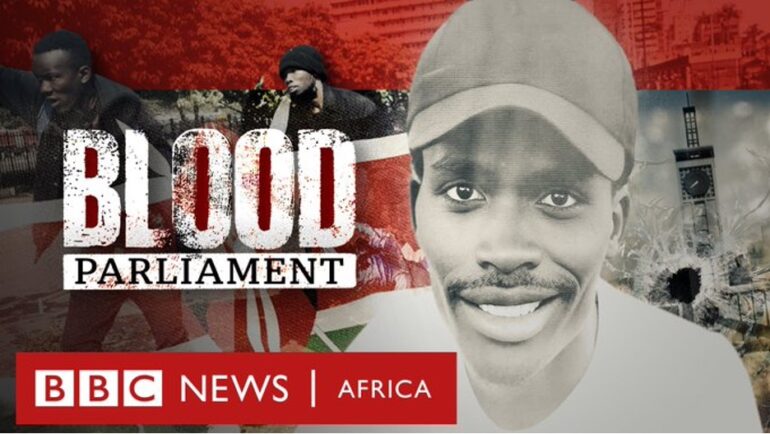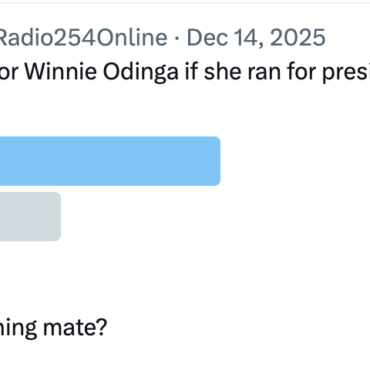Welcome to the inaugural edition of Keeping Up with the Discourse, a recurring column dedicated to unpacking the stories, debates, and undercurrents shaping our country. This week, we dive into Blood Parliament, the latest BBC Africa Eye documentary that has reignited Kenya’s collective grief and outrage over the violent crackdown on anti-tax protesters in June 2024. The film, released on April 28, 2025, exposes the lethal actions of security forces during a pivotal moment in Kenya’s recent history, raising questions about accountability, state power, and the role of the military in civilian affairs.

Reject the Finance Bill 2024
On June 25, 2024, thousands of young Kenyans, predominantly Gen Z, stormed Nairobi’s streets to protest the controversial Finance Bill 2024, which proposed tax hikes amid economic hardship. What began as a vibrant, social media-fueled demonstration—described by activist Boniface Mwangi as a “carnival” with Bluetooth speakers and water bottles—turned deadly when protesters breached Parliament. The BBC Africa Eye documentary, Blood Parliament, meticulously reconstructs the day’s events using over 5,000 images and videos, identifying security officers who fired on unarmed protesters. Among the casualties were Eric Shieni, a 27-year-old finance student shot in the head; David Chege, a 39-year-old software engineer; and Ericsson Mutisya, a 25-year-old butcher. The film reveals that these individuals posed no threat, contradicting official narratives. A private screening planned in Nairobi was abruptly canceled hours before its start, reportedly due to government pressure, though the documentary remains accessible on BBC Africa’s YouTube channel, nearing a million views within a day.
Contextualizing the Protests
The events of June 25 resonate deeply within Kenya’s historical and sociological fabric. The protests, driven by a digitally savvy youth disillusioned by corruption and economic stagnation, reflect a broader generational shift. Dubbed the “Gen Z uprising,” this movement leveraged platforms like TikTok and Instagram to mobilize, bypassing traditional political structures. Historically, Kenya has grappled with state violence during protests, from the 1980s coup attempt crackdowns to the 2007–2008 post-election violence, where media narratives often oversimplified conflicts as tribal. Blood Parliament situates itself in this lineage, exposing not just the act of violence but the state’s reluctance to investigate, as no officer has been held accountable despite a parliamentary order for the Independent Policing Oversight Authority (IPOA) to probe the deaths. Sociologically, the protests underscore a growing distrust in institutions, with youth rejecting austerity measures—like the Finance Bill—that exacerbate inequality in a nation where elites are perceived as untouchable. This moment marks a clash between an empowered, connected generation and a state clinging to control, echoing global trends of youth-led resistance from Hong Kong to Chile to Serbia. And who can forget the success of student led uprising that forced out Sheikh Hasina in Bangladesh?
The Military’s Shadow: A Betrayal of Trust
The documentary’s most shocking revelation is the involvement of the Kenya Defence Forces (KDF) in the killings, particularly the identification of a KDF soldier who fatally shot Eric Shieni at close range. This contrasts sharply with the KDF’s recent public image as a disciplined, professional force often lauded for regional peacekeeping and disaster response. For many Kenyans, the military had been a symbol of stability, distinct from the police’s tarnished reputation for brutality. Posts on X capture the disillusionment: “The BBC documentary on Blood Parliament has exposed the once respected KDF,” wrote @Dantorish1M, while @JangaRule called it “a betrayal of trust.” Historically, however, the KDF has a darker record, including allegations of excessive force during counterinsurgency operations in regions like Mount Elgon and Lamu. The Blood Parliament exposé suggests a return to this troubling past, undermining the military’s carefully cultivated image and fueling fears of its weaponization against civilians. The KDF’s response, denying any IPOA request to investigate its personnel and reaffirming its “constitutional mandate,” has done little to quell public anger.
Voices of Outrage and Calls for Justice
The documentary has sparked a firestorm of reactions across Kenya’s social and political spheres. Journalist Willis Raburu, visibly shaken, posted on X: “Watching Blood Parliament left me hollow, shaken, and profoundly heartbroken… It’s a solemn vow: Never forget. Never be silent.” Investigative journalist John-Allan Namu praised the film’s “devastating account” of the “June 25th murders,” while Senator Crystal Asige questioned whether the military, not just police, targeted youth, calling for deeper investigation.
However, not all reactions aligned. Homa Bay MP Peter Kaluma and nowadays a fierce defender of gthe regime, called for a ban on BBC Africa, accusing the documentary of “reckless” and “inciteful” reporting, a stance met with backlash online: “You can’t ban the truth,” one user retorted
Eugene Wamalwa’s DAP-Kenya party demanded International Criminal Court intervention, citing compromised local agencies. Faith Odhiambo, president of the Law Society of Kenya, condemned the shootings as intentional, stating, “The aim was to kill those protesters… You have become the judge, the jury, and the sentence executioner.” Despite these voices, the IPOA’s slow progress—22 of 60 death investigations completed, with only two cases in court—highlights a systemic reluctance to deliver justice.
Written by Otieno Arudo





